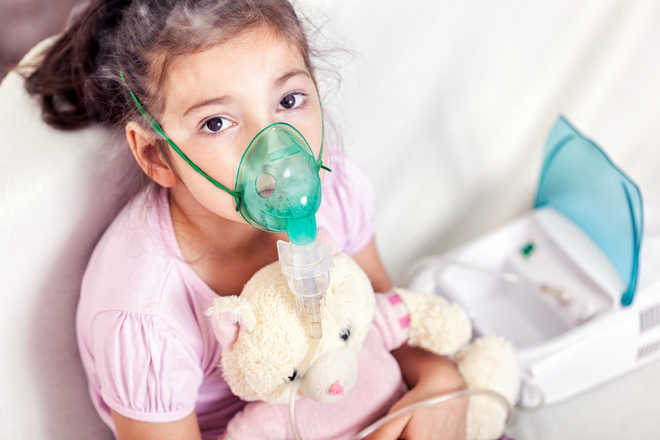Asthma cannot be cured but its symptoms can be controlled
Manav Mander
Tribune News Service
Ludhiana, May 7
Is burning an incense stick your daily ritual ? Are you fond of applying perfume before stepping out? Is anyone asthmatic in the family ? If yes, then you should be cautious if you regularly perform these activities. Not only air pollution, seasonal change or allergens but also burning incense sticks or applying perfume can trigger asthma.
The first Tuesday of May is observed as World Asthma Day and the theme for this year is ‘STOP for Asthma’. STOP stands for symptom evaluation, test response, observe and assess, and proceed to adjust treatment.
Asthma is a chronic disease of the airways characterised by long standing airway inflammation. To commemorate the World Asthma Day 2019, Civil Hospital, Khanna, organised an awareness campaign at Green Grove Public School, Mohanpur, Khanna.
While delivering the keynote address, Dr Rajinder Gulati, Senior Medical Officer, Civil Hospital, Khanna, said asthma is one of the major non-communicable diseases among children. In India, rough estimates indicate a prevalence of the disease between 10% to 15% among the children aged five to 11.
The talk was followed by an interactive session with asthmatic students along with their parents and teachers. In response to the queries put forth by the parents, Dr Gulati said although asthma could not be cured, appropriate management could control the disorder and enable people to enjoy a good quality of life.
He said that most people needed two types of medicines for asthma. Quick relief medicines called “relievers” are used to stop asthma attacks, whereas preventive medicines called “controllers” are used everyday to protect the lungs and keep asthma attacks from starting.
He also highlighted that earlier controller was not recommended for Step 1, i.e., reliever-only (inhaled short acting beta agonist) treatment was preferred, whereas now, it is recommended that all adults and adolescents with asthma should receive symptom-driven or regular low dose Inhaled Corticosteroid containing controller treatment to reduce the risk of serious exacerbations. Dr Gulati further said people with moderate to severe asthma must take long-term medication daily to control the underlying inflammation and prevent symptoms and attacks.
Responding to the queries raised by the parents on inhalation therapy, Dr Gulati said that inhalation therapy constituted the cornerstone of asthma treatment in adults and children of all age groups. He further added that medication was not the only way to control asthma. It is also important to avoid asthma triggers, stimuli that irritate and inflame the airways. With medical support, each person must learn what triggers he or she should avoid.
“Burning incense sticks or applying perfume can also trigger asthma in some patients, so families should be aware regarding what the triggers are,” he said. He also warned that failure to use appropriate medications or adhering to treatment could lead to preventable deaths.
Sanjeet Johnson, an associate professor, expressed his views regarding predisposing factors, sign and symptoms and prevention of asthma. “It is important for the asthmatic person to avoid irritants and substances which may trigger asthma. They should take the prescribed medications and quick relief inhalers prescribed by their physician,” he said.
Fortis Hospital, Ludhiana, also took the opportunity to raise awareness regarding asthma on this day.
“Bronchial asthma is an allergic condition of the lungs. For some people, asthma is a minor disease causing cough only but for others, it may be a major disease restricting their daily actuates or it may be life threatening. Asthma cannot be cured but its symptoms can be controlled. It is flared by exposure to various allergens like dust, smoke, air pollution, various cosmetics or aerosols, causing narrowing of our passages of lungs,” said Dr Sushil Gupta.
Symptoms of Asthma
- Chest tightness or pain
- Shortness of breath
- Trouble sleeping
- A whistling or wheezing sound when exhaling
Asthma triggers
- Airborne substances
- Respiratory infections
- Physical activity
- Cold air
- Air pollutants
- Stress
Precautions
- Avoid asthma triggers
- Monitor your breathing
- Take medicines regularly
- Always keep inhaler by your side










